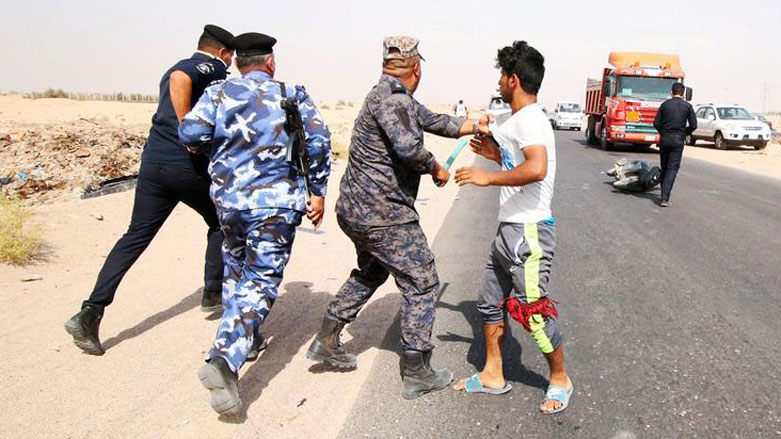Rights group documents excessive force against protesters by Iraqi forces

ERBIL (Kurdistan 24) – An international human rights organization documented multiple cases of Iraqi security forces firing on and beating protesters in the province of Basra during a series of demonstrations against poor services and low employment that have spread across much of the country.
According to a report from Human Rights Watch (HRW) released on Tuesday, forces, primarily from the Interior Ministry, used apparent excessive and unnecessary lethal force that has caused the death of at least three and have injured at least 47. These included two children who were shot and one who was beaten with rifle butts.
“The Iraqi authorities need to credibly and impartially investigate the apparent excessive use of lethal force in Basra, even where protests turned violent,” said Sarah Leah Whitson, Middle East director at HRW. “So long as the government fails to address protester grievances, the danger of further bloody protests remains real.”
In preparation for the report, HRW investigated eight protests between July 8 and 17. In six of them, security forces allegedly fired live ammunition, wounding at least seven protesters. They also threw rocks and beat at least 47 people, including 29 during or after arrest, read the report.
Witnesses said that, in five protests, demonstrators threw rocks, gasoline bombs, and burning tires at the security forces.
Since July 14, authorities have severely limited internet access across much of central and southern Iraq. International human rights law protects the right of people to freely seek, receive, and provide information through all media, said the report, including the internet.
"Security-related restrictions must be law-based and a necessary and proportionate response to a specific security concern."
“Blocking internet access to people in southern Iraq not only denies them their right to exchange information, but can put people in danger,” Whitson said. “The authorities should urgently lift all internet restrictions except where specific security concerns require such a response.”
Basra protesters told HRW they had three main demands: they want improved access to desalinated water since Basra’s potable water is heavily salinized during the summer and getting worse each year, they want the government to address Basra’s high rate of unemployment in the oil and other industries, and they want increased access to electricity, particularly during the hot summer months.
The protesters acknowledged commitments that Prime Minister Haidar al-Abadi and other authorities made on July 14 and 17 to allocate funds for desalination, improve access to electricity and health care, and create thousands of new jobs, but said they would only stop protesting once effective action was taken.
“Iraqi security forces engaged in law enforcement duties should strictly abide by the United Nations Basic Principles on the Use of Force and Firearms by Law Enforcement Officials,” HRW said, which state that "law enforcement officials should apply nonviolent means before resorting to the use of force."
Editing by John J. Catherine
